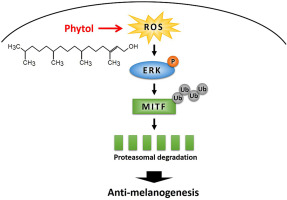Chemico-Biological Interactions ( IF 5.1 ) Pub Date : 2018-02-24 , DOI: 10.1016/j.cbi.2018.02.033 Gyeong-A. Ko , Somi Kim Cho

|
Phytol (3,7,11,15-tetramethyl-2-hexadecen-1-ol) is an acyclic monounsaturated diterpene alcohol generated from chlorophyll metabolism that exerts anti-inflammatory, antithrombotic, antimicrobial, and antitumor effects. However, the effect of phytol on melanogenesis and the underlying molecular mechanisms of its inhibition remain unknown. Here, we found that phytol suppressed α-melanocyte-stimulating hormone-induced melanogenesis in B16F10 murine melanoma cells without any toxic effects. Phytol significantly attenuated melanin production by reducing the expression of tyrosinase and tyrosinase related protein 1. Treatment with phytol inhibited the expression of microphthalmia-associated transcription factor (MITF) by phosphorylating extracellular signal-regulated protein kinase (ERK). The ERK inhibitor PD98059 restored MITF expression and prevented the anti-melanogenic effect of phytol. We found that the ERK inhibitor coincidently abrogated MITF ubiquitination and degradation, suggesting that the ERK pathway is involved in phytol-induced ubiquitination of MITF. Furthermore, our data show that reactive oxygen species (ROS) production was increased in cells treated with phytol. Consistently, a ROS scavenger inhibited ERK phosphorylation and restored MITF degradation. Accordingly, the intermediary role of ROS was confirmed in phytol-induced MITF degradation. Taken together, these results demonstrate that phytol stimulates ROS production and modulates ERK-mediated proteasomal degradation of MITF in B16F10 murine melanoma cells. These findings suggest that phytol may have potential to be utilized as a whitening agent in cosmetics and as a therapy for skin hyperpigmentation.
中文翻译:

phytol通过ROS-ERK信号通路通过MITF的蛋白酶体降解来抑制黑色素生成
植物醇(3,7,11,15-四甲基-2-十六碳烯-1-醇)是一种无环的单不饱和二萜醇,由叶绿素代谢产生,具有抗炎,抗血栓形成,抗微生物和抗肿瘤作用。然而,植醇对黑素生成的影响及其潜在的抑制分子机制仍然未知。在这里,我们发现植醇抑制了B16F10鼠黑色素瘤细胞中α-黑素细胞刺激激素诱导的黑色素生成,而没有任何毒性作用。植醇通过降低酪氨酸酶和酪氨酸酶相关蛋白的表达而显着降低了黑色素的产生。植醇的处理通过磷酸化细胞外信号调节蛋白激酶(ERK)抑制了小眼科相关转录因子(MITF)的表达。ERK抑制剂PD98059恢复MITF的表达并阻止了植醇的抗黑色素生成作用。我们发现,ERK抑制剂同时废除了MITF泛素化和降解,这表明ERK途径参与了由植物醇诱导的MITF泛素化。此外,我们的数据表明,用植醇处理的细胞中活性氧(ROS)的产生增加了。始终如一,ROS清除剂抑制ERK磷酸化并恢复MITF降解。因此,证实了ROS在植物醇诱导的MITF降解中的中介作用。两者合计,这些结果表明植醇刺激B16F10鼠黑素瘤细胞中MITF的ROS产生并调节ERK介导的蛋白酶体降解。



























 京公网安备 11010802027423号
京公网安备 11010802027423号